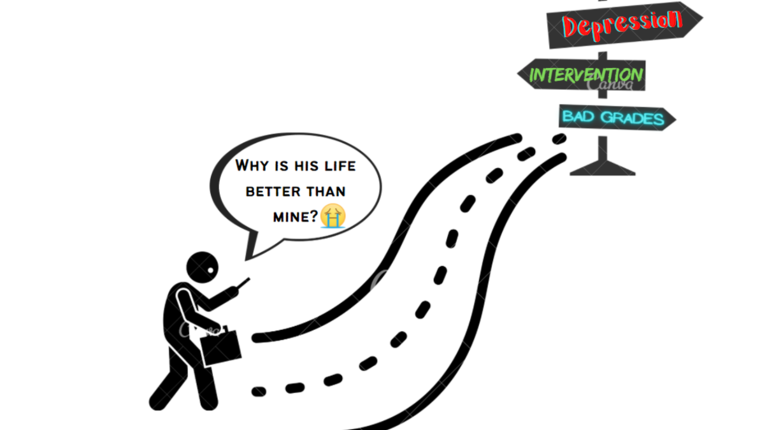Put the Phone Down.
By Ammar Syed
Would you be surprised if I told you that 15 to 30 million Americans suffer from social media addiction? The world has rapidly changed in the last decade and continues to do so at an extremely alarming rate. The introduction of the internet, then social media, has led to a completely digitally integrated society. This rapid globalization has had multiple benefits such as connecting people all around the world, however, repercussions of this rapid development are incoming, if not here already. Social media has largely contributed to globalization and its negative impacts. Just like with anything positive, an excessive amount of it can lead to negative outcomes. According to Jena Hilliard from AddictionCenter.com, “Social media addiction is a behavioral addiction that is characterized as being overly concerned about social media, driven by an uncontrollable urge to log on to or use social media, and devoting so much time and effort to social media that it impairs other important life areas.” It’s a little scary to think about how social media addiction has been rapidly increasing over these last few years. It is important to research the effects of social media addiction and how to alleviate those who suffer. Although people understand the impact, there haven’t been studies developing solutions to this growing problem.
This was the point of interest for Dr. Qi Wang and Dr. Yubo Hou, experts in human development and social psychology, respectively. They performed a study at Peking University to determine the impacts of social media addiction and the consequences for mental health and academic performance in college students. They investigated whether social media addiction and its negative effects can be reduced by some means of intervention. Although it sounds so simple, this is the first study of its kind aimed at developing a solution for those suffering from this illness.
The study consisted of two main experiments, (1) first observing the impact of social media addiction on mental health and subsequently academic performances of students, and (2) determining whether or not some level of intervention is helpful for students trapped in this addiction.
Study 1, consisted of 232 individuals who answered a questionnaire on four main subtopics: social media addiction, mental health, academic performances, and self-esteem. The students were told that all the listed topics were unrelated to each other in order to preserve the integrity of their responses. Each section had specific questions to help determine the depth of their struggles. For example, yes or no questions regarding mental health were posed as such: “I feel that being alive has no meaning”, “I feel unsettled or nervous all day long”, and “I go happily through daily life” (Hou et al., 2019). After going through the surveys, the researchers confirmed their hypothesis that social media addiction was negatively associated with mental health and academic performance. Basically, they showed that increased social media usage led to poor mental health. However, the association between academic performances and social media addiction was weaker; essentially showing that academic performance was dependent on each person’s interaction with social media, and how they balanced their distractions and school.
Study 2, was conducted with 43 participants who met the requirements of needed intervention from Study 1. Participants were given a one-week intervention program containing two parts: a cognitive reconstruction stage and a tracking stage. The cognitive reconstruction stage required participants to reflect on their social media usage and seek adequate help. The tracking stage required participants to record their “thoughts, emotions, and behaviors related to social media use, as part of the cognitive-behavioral techniques” (Young 1999). After the intervention, the participants were asked to fill out another survey to identify areas of improvement. The overall result of Study 2, is that participants felt that intervention helped them by improving their self-esteem and overall sleep quality. Those who underwent intervention also reported increased learning engagement and better emotional state. Thus, the experiment successfully assessed the outcomes of a cost-effective intervention.

The rise of social media has significantly contributed to the rapid globalization of the last couple of decades and it is important that people realize that with benefits comes repercussions. It is also crucial for people to figure out how to deal with these repercussions through cost-effective solutions. This research was one of the first studies, at the time, done on social media addiction and its impacts on mental health and academics. It highlights the importance of balance, especially in today’s world. Instead of looking at the world through someone else's lens try looking through your own. Research shows it might just make you happier.
References
Hilliard, J., & Parisi, T. (2019). Social Media Addiction. Addiction Center. https://www.addictioncenter.com/drugs/social-media-addiction/
Hou, Y., Xiong, D., Jiang, T., Song, L., & Wang, Q. (2019). Social media addiction: Its impact, mediation, and intervention. Cyberpsychology: Journal of Psychosocial Research on Cyberspace, 13(1), Article 4. https://doi.org/10.5817/CP2019-1-4
Young, K. S. (1999). Internet addiction: Symptoms, evaluation and treatment. In L. VandeCreek & T. L. Jackson (Eds.), Innovations in clinical practice: A source book (Vol 17, pp. 19–31). Sarasota, FL: Professional Resource Press.